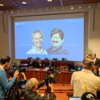-

Hon får tungt uppdrag i Astra Zeneca – ersätter frihetsberövad Kinachef
Astra Zeneca utser Iskra Reic till Executive Vice President (EVP), International. Det betyder att hon får ansvar för bolagets övergripande strategi i stora delar av världen utanför Nordamerika – och att hon efterträder den tidigare Kinachefen Leon Wang som utreds av kinesiska myndigheter.
-

Novo Nordisk to invest billions in new quality control lab
Novo Nordisk has announced plans to invest 2.9 billion Danish kroner in order to establish a new quality control laboratory in Hillerød in northern Zealand, Denmark.
-

Investigations against AstraZeneca: ”Chinese interests may be behind them”
Why are there several investigations against AstraZeneca employees in China right now? Life Science Sweden continues to seek answers.
-

Utredningarna mot Astra Zeneca: ”Kinesiska intressen kan ligga bakom”
Varför pågår det flera utredningar mot Astra Zeneca-anställda i Kina just nu? Life Science Sweden fortsätter att nysta i härvan.
-

Tungt namn föreslås ta över klubban i Sobi
Valberedningen i särläkemedelsbolaget Sobi föreslår att David Meek utses till ny styrelseordförande vid en extra bolagsstämma i december.
-

Her company is developing a new tablet form obesity drug
Obesity and diabetes are the primary targets of a new tablet treatment under development by Malmö-based Pila Pharma. The company’s ambition is to take on the billion-selling GLP1 analogues. ‘‘Basically, I expect all the beneficial effects that they have, but not the same side effect profile,’’ company founder Dorte X Gram said in an interview with Life Science Sweden.
-

This years Nobel prize in medicine – “Changed the understanding of how genes are controlled”
This year’s Nobel Prize in Physiology or Medicine goes to the discovery that small RNA molecules, known as microRNAs, control how genes are regulated. Understanding the mechanism has changed our view of human biology and evolution, says KI Professor András Simon.
-

Medicinpriset till forskare som upptäckte mikro-RNA:s roll i genreglering
Årets Nobelpris i fysiologi eller medicin går till Victor Ambros och Gary Ruvkun för deras upptäckter om användningen av mikro-RNA inom posttransitionell genreglering.
-

“We should avoid surgery if we can”
Since February this year, she has been Scientific Director Life Science at the Karolinska Institutet. Life Science Sweden met Anna Martling for a talk about role models, surgery and Sweden’s strengths and weaknesses in medical research.
-

Nobel Prize winner Torsten Wiesel turns 100: “Old men like me should use their experience to help the young”
In 1955, a young Torsten Wiesel jumped on a boat to the US and embarked on a fabulous career as a neuroscientist, crowned with a Nobel Prize for his work. Now 100 years old, he looks back on an intense life and his upbringing in Stockholm, Sweden, which shaped his desire to help the vulnerable in society.
-

Ny styrelseordförande för Anacardio
Michael Grissinger har utsetts till ny ordförande för Anacardios styrelse.
-

Nobelpristagaren Torsten Wiesel fyller 100: ”Gamla gubbar som jag ska använda erfarenheten till att hjälpa de unga”
Året var 1955 när en ung Torsten Wiesel hoppade på båten till USA och inledde en sagolik karriär som hjärnforskare med ett Nobelpris som kronan på verket. Nu fyller han 100 år och ser tillbaka på ett intensivt liv – och på uppväxten i Bromma som formade hans vilja att hjälpa samhällets svaga.
-

Innovative start-up helps doctors, scientists and industry balance coagulation risks
For many doctors caring for seriously ill patients, for example, in stroke units and cancer wards, maintaining the life-saving balance between bleeding and thrombosis is an ongoing challenge. In the late 1980s, scientists at Maastricht University in the Netherlands developed an innovative method, the thrombin generation assay (TGA), which provides a complete overview of a physiological process crucial for maintaining normal haemostasis.
-

Samuel Lagercrantz: “Companies that do this successfully will take the lead”
The development of new medicines and medical technologies should not focus too narrowly on prolonging life. It is equally important to develop treatments that relieve pain or eliminate painful symptoms, writes Samuel Lagercrantz in an editorial.
-

Radioactive tracer to measure effect of drug towards Crohn’s disease
A radioactive tracer developed by Astra Zeneca and the Karolinska Institutet may play a major role for patients with Crohn's disease. That is the belief of Maria Belvisi at AstraZeneca.
-

Icoat Medical startar vetenskapligt råd
Stockholmsbolaget Icoat Medical startar ett vetenskapligt råd med syfte att stärka bolagets forskning och utvecklingsprogram. Rådet består av tre läkare med expertis inom transplantationer.
-

Raised millions to develop a treatment for ´butterfly children´
Fragile as a butterfly’s wing – that’s how people living with Epidermolysis Bullosa are usually described. The Lund-based company Xinnate recently raised SEK 100 million in a new share issue to finance the development of a treatment they hope will give those affected an improved quality of life.
-

”Information security must become part of the Swedish life science strategy”
Sweden needs knowledge security to stand strong in the global competition, writes Björn Ursing in an opinion article.
Få tillgång till allt innehåll på Life Science Sweden
Ingen bindningstid eller kortinformation krävs
Redan prenumerant? Logga in
Gäller endast personlig prenumeration.
Kontakta oss för en företagslösning.